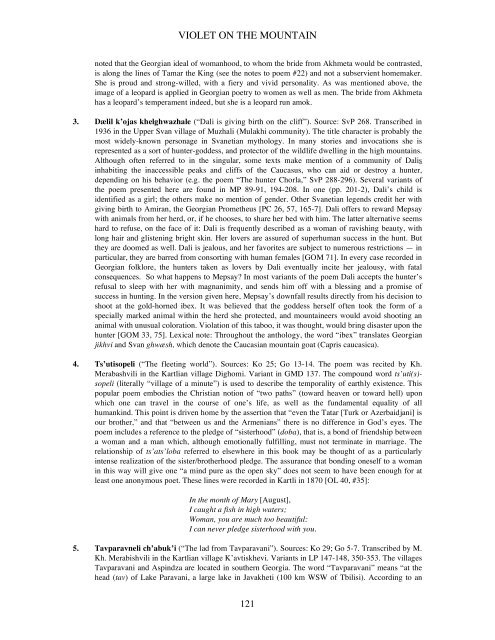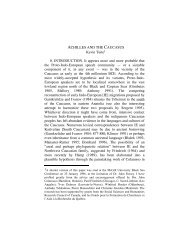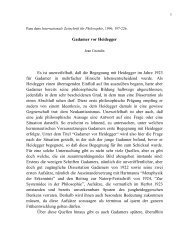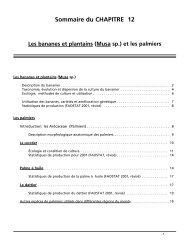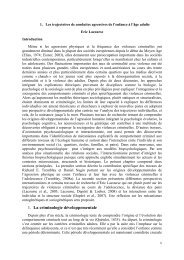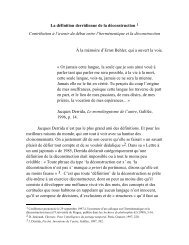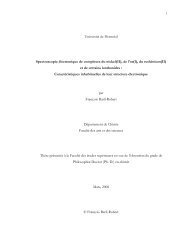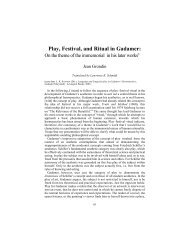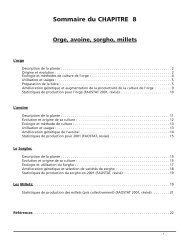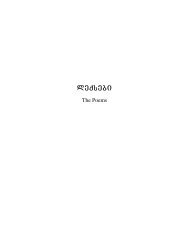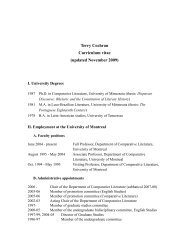Create successful ePaper yourself
Turn your PDF publications into a flip-book with our unique Google optimized e-Paper software.
VIOLET ON THE MOUNTAIN<br />
noted that the Georgian ideal of womanhood, to whom the bride from Akhmeta would be contrasted,<br />
is along the lines of Tamar the King (see the notes to poem #22) and not a subservient homemaker.<br />
She is proud and strong-willed, with a fiery and vivid personality. As was mentioned above, the<br />
image of a leopard is applied in Georgian poetry to women as well as men. The bride from Akhmeta<br />
has a leopard’s temperament indeed, but she is a leopard run amok.<br />
3. Dælil k’ojas khelghwazhale (“Dali is giving birth on the cliff”). Source: SvP 268. Transcribed in<br />
1936 in the Upper Svan village of Muzhali (Mulakhi community). The title character is probably the<br />
most widely-known personage in Svanetian mythology. In many stories and invocations she is<br />
represented as a sort of hunter-goddess, and protector of the wildlife dwelling in the high mountains.<br />
Although often referred to in the singular, some texts make mention of a community of Dalis<br />
inhabiting the inaccessible peaks and cliffs of the Caucasus, who can aid or destroy a hunter,<br />
depending on his behavior (e.g. the poem “The hunter Chorla,” SvP 288-296). Several variants of<br />
the poem presented here are found in MP 89-91, 194-208. In one (pp. 201-2), Dali’s child is<br />
identified as a girl; the others make no mention of gender. Other Svanetian legends credit her with<br />
giving birth to Amiran, the Georgian Prometheus [PC 26, 57, 165-7]. Dali offers to reward Mepsay<br />
with animals from her herd, or, if he chooses, to share her bed with him. The latter alternative seems<br />
hard to refuse, on the face of it: Dali is frequently described as a woman of ravishing beauty, with<br />
long hair and glistening bright skin. Her lovers are assured of superhuman success in the hunt. But<br />
they are doomed as well. Dali is jealous, and her favorites are subject to numerous restrictions — in<br />
particular, they are barred from consorting with human females [GOM 71]. In every case recorded in<br />
Georgian folklore, the hunters taken as lovers by Dali eventually incite her jealousy, with fatal<br />
consequences. So what happens to Mepsay? In most variants of the poem Dali accepts the hunter’s<br />
refusal to sleep with her with magnanimity, and sends him off with a blessing and a promise of<br />
success in hunting. In the version given here, Mepsay’s downfall results directly from his decision to<br />
shoot at the gold-horned ibex. It was believed that the goddess herself often took the form of a<br />
specially marked animal within the herd she protected, and mountaineers would avoid shooting an<br />
animal with unusual coloration. Violation of this taboo, it was thought, would bring disaster upon the<br />
hunter [GOM 33, 75]. Lexical note: Throughout the anthology, the word “ibex” translates Georgian<br />
jikhvi and Svan ghwæsh, which denote the Caucasian mountain goat (Capris caucasica).<br />
4. Ts’utisopeli (“The fleeting world”). Sources: Ko 25; Go 13-14. The poem was recited by Kh.<br />
Merabashvili in the Kartlian village Dighomi. Variant in GMD 137. The compound word ts’uti(s)sopeli<br />
(literally “village of a minute”) is used to describe the temporality of earthly existence. This<br />
popular poem embodies the Christian notion of “two paths” (toward heaven or toward hell) upon<br />
which one can travel in the course of one’s life, as well as the fundamental equality of all<br />
humankind. This point is driven home by the assertion that “even the Tatar [Turk or Azerbaidjani] is<br />
our brother,” and that “between us and the Armenians” there is no difference in God’s eyes. The<br />
poem includes a reference to the pledge of “sisterhood” (doba), that is, a bond of friendship between<br />
a woman and a man which, although emotionally fulfilling, must not terminate in marriage. The<br />
relationship of ts’ats’loba referred to elsewhere in this book may be thought of as a particularly<br />
intense realization of the sister/brotherhood pledge. The assurance that bonding oneself to a woman<br />
in this way will give one “a mind pure as the open sky” does not seem to have been enough for at<br />
least one anonymous poet. These lines were recorded in Kartli in 1870 [OL 40, #35]:<br />
In the month of Mary [August],<br />
I caught a fish in high waters;<br />
Woman, you are much too beautiful:<br />
I can never pledge sisterhood with you.<br />
5. Tavparavneli ch’abuk’i (“The lad from Tavparavani”). Sources: Ko 29; Go 5-7. Transcribed by M.<br />
Kh. Merabishvili in the Kartlian village K’avtiskhevi. Variants in LP 147-148, 350-353. The villages<br />
Tavparavani and Aspindza are located in southern Georgia. The word “Tavparavani” means “at the<br />
head (tav) of Lake Paravani, a large lake in Javakheti (100 km WSW of Tbilisi). According to an<br />
121


